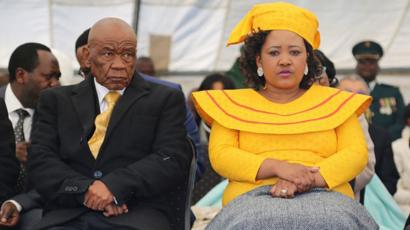When he celebrates his 81st birthday at the end of May, it is likely Thomas Thabane will no longer be prime minister of Lesotho.
But that isn’t a certainty for the wily politician who’s held various state positions over the past four decades—serving a term as prime minister from 2012 to 2015, and just as it seemed he was leaving the political arena for good, Thabane returned for a second term in 2017 at the sprightly age of 78.
Over the past few months he’s maintained an unyielding grip on the job, despite numerous attempts to get him to step down.
But now, he’s under an inordinate amount of pressure to resign.
This, over the case in which he and his current wife are alleged to have colluded to murder his former wife.
They both deny any involvement in the death. The allegations of murder have presented a challenge to the country’s judiciary; about whether or not a sitting head of state can be charged and put on trial for such a crime.
Thabane has been resolute that he has no plans of ceding power; and that he can’t be charged while still leading the country. But his spokesperson has said Thabane will resign by May 22.
All this is happening as the backdrop to Lesotho, a tiny hilly landlocked kingdom of 2.1 million encircled by South Africa, becoming the last African country to confirm its first coronavirus case since the pandemic started spreading on the continent over two months ago. South Africa has the highest number of cases in Sub Saharan Africa with nearly 13,000.
The ruling ABC party recently appointed finance minister Moeketsi Majoro as its new leader. But Thabane is insisting that the appointment of Majoro as leader did not follow proper procedures and was therefore invalid.
King Letsie III can fire Thabane if he doesn’t resign before May 22, according to Thabane’s own ABC party. This would be on the grounds Thabane no longer commands the majority party. The beleaguered prime minister however seems to be attempting to circumvent this by claiming that he, and not Majoro, is still the official leader of the ruling ABC.
The prime minister has however told AFP he will send a resignation letter to King Letsie III. The terms of the resignation are not yet clear. There is no indication of whether or not he will serve notice, nor of when his final day in office will be.
A last ditch effort to hold onto power through a coalition, fell apart on Monday, May 11.
Consequently, Thabane is required to step down by the end of next week to make way for a new government.
With Lesotho being a constitutional monarchy, this new government will only affect political appointments. King Letsie III’s position is secure. Most of his duties as monarch are ceremonial, however he has recently assented to legislation that prevents prime minister Thabane from dissolving parliament.
Prior to this amendment, it would have been feasible for Thabane to call an election in the event of a vote of no confidence against him. The new law means he would have no choice but to leave office following a no confidence vote.
“He banks on his privileges for immunity that he claims to have,” says Seabata Makoae, a Lesotho-based development strategist. “Our courts are comprised and divided, so in the meantime he is probably negotiating an exit by which this case will not follow him.”
Thabane’s request for immunity from prosecution after leaving office has been rejected by the governing party.
In light of this, one of the strategies Thabane seems to be employing, is staying in power for as long as possible. With a new coalition having been formed this week, he meet its leaders on Wednesday 13 May 2020 and insisted that he should be the head of the new coalition.
This because he was still the leader of the majority party, the ABC.
(Source: Quartz Africa)

